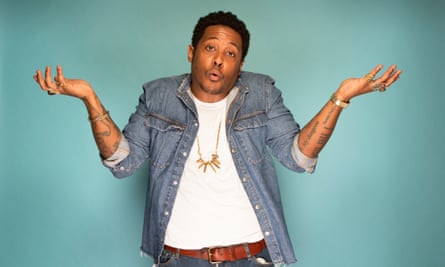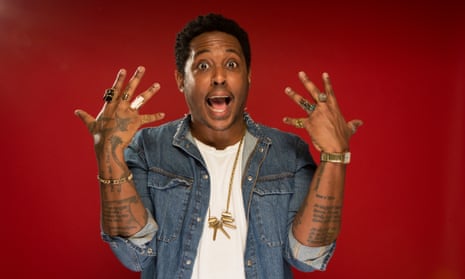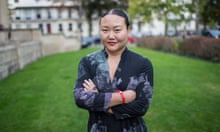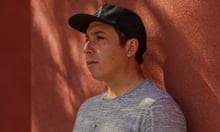If you watch Danez Smith’s poem dear white america on YouTube – where it has racked up more than 300,000 viewings (not the sort of figures poetry usually attracts) – it is easy to see why Smith is becoming a phenomenon. The video is a powerful introduction to the collection Don’t Call Us Dead (a finalist in the US’s National Book award for poetry), which is about to be published in the UK. Smith has a colossal gift for performance. You are moved – shaken – as if you had been involved in an argument you couldn’t win. And, in a sense, if you are white, that describes the position. The poem – set out like prose – is a raging, calculated polemic that needs no critic (though the New Yorker has devoted pages to Smith), and that contains its own commentary. It imagines leaving Earth in search of somewhere black people can uncomplicatedly reside. It builds quickly, turns emotion inside out, presents valediction as protest. Smith has the first and last word, and all those in between.
This is a significant moment for poetry. We are meeting days after Ocean Vuong (gay, Vietnamese and a friend of Smith’s) won the TS Eliot prize, and it is tempting to think poetry is at a turning point, belatedly diversifying, relaxing its borders. The reality is that there is still a long way to go, but this is a flicker of intent, the poetic ghettoising becoming less flagrant. It’s a mainstream momentum that began in 2014 with Claudia Rankine’s Citizen – the distinguished, award-winning and bestselling collection interrogating racism in America.
It needs to be said straight away, if only for practical purposes, that Danez (stress on the second syllable), who is African American, gay, gender-neutral and HIV positive, prefers to be referred to as “they”. When we meet, Smith confirms that “they” feels more comfortable than the alternative “ze” because: “I feel like many people sometimes.” The plurality is also perfect for a poet who speaks for, and to, so many and who should be read by everyone.
I first clap eyes on Danez in rainy Manchester, before sitting in on a poetry reading on Radio 3’s The Verb. We converge in the studio foyer where Mary Berry is cooking quietly on a screen next to us. I don’t like the look of her winter soup, I say. Smith, sitting next to me, almost springs off the bench in indignation, as if unable to consider continuing to talk to me now that I have revealed myself a heretic. Smith confesses to being a huge fan of The Great British Bake Off – weeping over its winners.
Like some of the greatest actors, Smith, who is 28, has the ability to seem ordinary offstage, to become invisible at will. Wearing a warm, striped yellow-and-maroon knitted scarf, clunky specs, jeans and a rucksack, the poet could be a student, or a BBC sound engineer. But there is no subduing the sunburst smile or the charm. Tattoos, often showily visible in performance, can barely be seen sneaking out from cuffs. Only the fingers give away a taste for over-the-top attire. The rings are an assortment of knuckledusters: an eye-catching family of misfits and bruisers. They are toned down today, Smith insists.
In its way, dear white america is a knuckleduster of a poem. Another is dinosaurs in the hood (Smith eschews the upper case throughout all the poems, always favouring the little ‘i’), exploding racial stereotyping, imagining the devising of a dinosaur movie: “this movie can’t be about race./ this movie can’t be about black pain or cause black pain/ this movie can’t be about a long history of having a long history with hurt.” It is a poem about giving metaphor the slip, about shaking off the shackles of white interpretation. Both are poetic dynamite (not all the poems are as full-on). Smith tells me that the online success of Dear White America and other poems about black struggle has made things complicated. Although great news in one way, it felt uncomfortable to profit from suffering (Smith makes a living through gigs).
And when, days after our meeting, I hear Smith perform in London’s LRB bookshop, I am struck by the tone of buoyant confrontation, Smith telling the white Brits in the audience not to feel detached as they listen to dear white america, adding: “You invented racism.” The performance has extraordinary projection, adrenalin and vocal range. Smith hustles, mourns and jubilates (a verb just made for Smith) – “Look, I’m not going to manufacture/any more sadness” – and sometimes, breaks into song.
“I came into poetry through theatre. My first poem, aged 14, was for acting class at high school in Minnesota.” Later, slam poetry contests refined performance: “Slam doesn’t allow you to be stagnant.” Smith seldom rehearses: “Once you memorise something, it is in your body.” The New Yorker’s Dan Chiasson salutes Don’t Call Us Dead for situating “the black queer body” in contemporary American space, tracked by a mind that is a “wild and unpredictable instrument”. Yet the poetry is not solipsistic: it prioritises community. Smith confirms the “value of community for the marginalised” before letting slip: “You don’t have the luxury of being an individual.” That seems a hell of a thing to say… “I mean it. To be black, queer or poor – to be an individual has always meant death for us. To be a woman alone is dangerous – we teach our daughters that, we teach black people that. Our liberation comes through community, organising, collectivising. Individuality has meant death. Individuality has meant being marooned. Individuality is a privilege, right? The only people who can think of themselves as separate from the other people who have made their lives possible are straight white dudes.”
Smith sees white America as obsessed with meritocratic stories of self-made men: “Whenever I see an ‘I’, I think about who else is behind that ‘I’… President Trump calls himself a ‘self-made billionaire’ but started with a million-dollar loan from his father.”
So has poetry gone into a new gear since Trump’s election? “For me, Trump is not an anomaly. For some folks, he was a surprise. But if you had been paying attention to conservatism, racism, attitude to immigrants, homophobia – those darker strains – you can follow the path to Trump. Every poem is political. In poems not obviously political, the writer is trying to avoid something. I hope Trump will move poets who have long thought of poems as apolitical to reconsider.”
Smith sees this as a great age for American poetry, but adds: “We need to recognise more trans verses and young women poets. British poetry is a decade or two behind America in terms of publishing people of colour and in the awards and in recognising the need for different gatekeepers. Thank God Ocean won the TS Eliot prize, but when you look at the other finalists and judges, it raises questions.”
Don’t Call Us Dead raises questions too, unsettlingly balanced between the funereal and affirmative (one title is Every Day Is a Funeral & a Miracle). “In America, all the land is haunted,” Smith explains. “It is a nation based on genocide and enslavement. Minnesota is imbued with the spirits of indigenous folk almost wiped out so we could be there. When I go to Mississippi, I feel connected to the spirits of my family who are buried in that ground, worked that ground, helped build America into what it is with the free labour they were forced to provide. My poems try to honour the dead but also protect folks who are still here.”
Smith is single (a status thrown out flirtatiously on Radio 3’s The Verb) and says: “Poems have helped me figure out a lot about queer sexuality – it is a big hill to climb. The ability to transform myself in poetry helps me imagine myself differently in the real world.”
But the “gender hill” is still to be climbed: “One goal this year is to be braver about portraying my inward feelings.” Smith insists the love poems are “collages” about “a lot of folks” and adds: “I’m not a romantic. I love my family, community and friends way more than any boy. Romantic love is uninteresting until there is something to complicate it.”
Being HIV positive has been that complication. Smith reveals that the powerful poem strange dowry is, intriguingly, a projection, written before diagnosis: “I had a partner who was HIV positive and wanted to write about this type of sex we could never have, at least at the time.” The poem contains this melancholy exclamation: “what a strange gift to need, the good news that the boy you like is dying too”. Smith talks movingly about poets who died of Aids: “Essex Hemphill and Assotto Saint – I think about them all the time. They were gay, black and passed away in the 90s. They had such a clear vision about what it meant to survive with this disease. I want to sit with them and ask what their perfect world would be. I want to know what they think of this current moment. I want their marching orders.”
Smith grew up in the Rondo neighbourhood of St Paul, Minnesota, a “very black upbringing”. Last Summer of Innocence, a beautiful poem, describes the teenage boy showing off to girls and ends in accidental joy:
i spent all day in my brothers’ arms
& wanted that to be forever
boy after boy after boy after boy
pulling me down into the dirt.
The collection is dedicated to Smith’s mother, “my best friend”. A secretary in a law office, she is “amazing. She starts from a place of kindness, of graciousness. She thinks about how to benefit other people. She is involved in the church and a mentor to single mothers – she was one herself. She is an avid reader and writer, with a novel perpetually not done. Some of my favourite memories are of us heading to the library together.”
Coming out was neither easy nor planned: “I was 16 and coming back from being a camp counsellor and I was a bit drunk after leaving drinks. My mom and grandmom turned up and I told them a boy had come out at camp. Mom asked: ‘How do you feel about that?’ I said: ‘Well, I’m bi’, and then realised I’ve just came out to my family in the car.” A turbulent night followed. “My grandmother is a very serious Christian. My mother was also very flustered. The next day, Mom was fine. She wrote me a letter – left it at my door. It made me realise coming out is a process for the whole family. You have to allow time for something to shift for them too. I’m proud of my family. They’ve come a long way. My grandmother was slow, but now I can talk about men around her, it’s not a big deal. My grandfather was more openly a homophobe. He got prostate cancer around the time I came out – so we never told him.”
Growing up in a devout family, it is no surprise that God should figure in Smith’s poetry. But is God a he, she or they? “God is ‘They’ [laughter]. I like to think of all the different paths that get us to the same place. Who am I to say my mother’s God is not real? What is your north star leading you towards goodness? That is your God. I’m obsessed with doors and God is your door to doing good.”
What this means in poetic terms is “trying to offer up something honest and grand, to reward somebody for taking the time to engage”. Smith defines poetry’s power to “make small things momentous, the overwhelming tameable, the intangible tangible, things that feel impossible possible”. On one arm, Smith has the word “limitless” tattooed, on the other “freedom”. Goals or self-description? “They were goals, now they’re true.” [Laughter.] Round Smith’s neck is a tattoo, a lyric from an Al Green song: “Make you do wrong, make you do right.” No tattoos of a Danez Smith poem? “I don’t like my poems enough … my body is my poem.” The first collection, Boy, was, says Smith, full of “joyous failures”, adding: “All art-making is about failure. We never get it right. But poems are not poems if they make people feel dead. I want people to feel alive – even if it is alive with grief. I want people to feel their blood moving by the time I’m done.” A pause. “You can do anything in a poem, right?”

Don’t Call Us Dead by Danez Smith is published by Chatto & Windus (£10.99). To order a copy for £9.34 go to guardianbookshop.com or call 0330 333 6846. Free UK p&p over £10, online orders only. Phone orders min p&p of £1.99
dear white america
i’ve left Earth in search of darker planets, a solar system revolving too near a black hole. i’ve left in search of a new God. i do not trust the God you have given us. my grandmother’s hallelujah is only outdone by the fear she nurses every time the blood-fat summer swallows another child who used to sing in the choir. take your God back. though his songs are beautiful, his miracles are inconsistent. i want the fate of Lazarus for Renisha, want Chucky, Bo, Meech, Trayvon, Sean & Jonylah risen three days after their entombing, their ghost regifted flesh & blood, their flesh & bone re-gifted their children. I’ve left Earth, i am equal parts sick of your go back to Africa & i just don’t see race. Neither did the poplar tree. we did not build your boats (though we did & we fill them too). we did not ask to be part of your America (though are we not America? her joints brittle & dragging a ripped gown through Oakland?). i can’t stand your ground. i’m sick of calling your recklessness the law. each night, i count my brothers. & in the morning, when some do not survive to be counted, i count the holes they leave. i reach for black folks & touch only air. your master magic trick, America. now he’s breathing, now he don’t. abra-cadaver, white bread voodoo. sorcery you claim not to practice, hand my cousin a pistol to do your work. i tried, white people. i tried to love you, but you spent my brother’s funeral making plans for brunch, talking too loud next to his bones. you took one look at the river, plump with the body of boy after girl after sweet boi and ask why does it always have to be about race? because you made it that way! because you put an asterisk on my sister’s gorgeous face! call her pretty (for a black girl)! because black girls go missing without so much as a whisper of where?! because there are no amber alerts for amber-skinned girls! because Jordan boomed. because Emmett whistled. because Huey P. spoke. because Martin preached. Because black boys can always be too loud to live. because it’s taken my papa’s & my grandma’s time, my father’s time, my mother’s time, my aunt’s time, my uncle’s time, my brother’s and my sister’s time … how much time do you want for your progress? i’ve left Earth to find a place where my kin can be safe, where black people ain’t but people the same color as the good, wet earth, until that means something, until then i bid you well, i bid you war, i bid you our live to gamble with no more. i’ve left earth & i am touching everything you beg your telescopes to show you. i’m giving stars their right names. & this life, this new story & history you cannot steal or sell or cast overboard or hang or beat or drown or own or redline or shackle or silence or cheat or choke or cover up or jail or shoot or jail or shoot or ruin
this, if only this one, is ours.











Comments (…)
Sign in or create your Guardian account to join the discussion